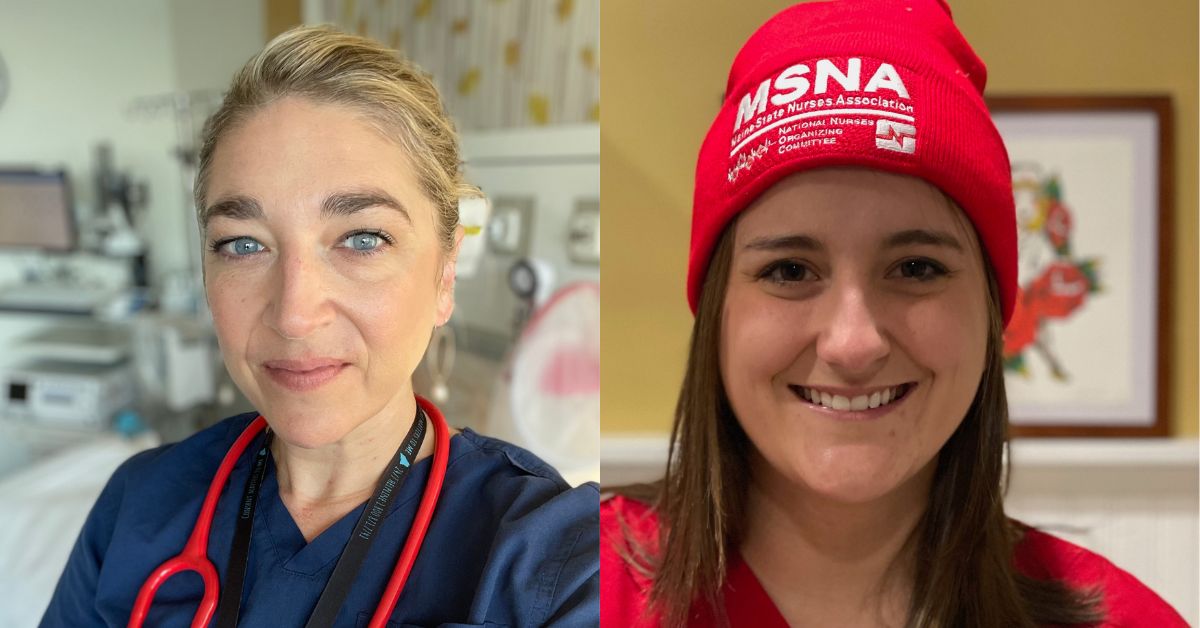Knowledge is Power

Rounding is key to getting and distributing information
By Chuleenan Svetvilas
National Nurse magazine - July | August | September 2025 Issue
“Information is power. During rounding we can encounter issues in real time,” said Erin Oberson, RN in the labor and delivery unit at Eastern Maine Medical Center in Bangor, Maine. “Without rounding, we would not have found out about charge nurses in a few units being asked to do additional documentation about staffing.”
Rounding is an opportunity to talk to people face-to-face in their unit, distribute information, and organize. Members of the Professional Practice Committee (PPC) often round on the same day as their monthly meeting. The PPC is a committee run by staff nurses, which means RNs set the agenda for each meeting, including the meetings attended by management. PPC members are elected by nurses, with each member representing specific units in the facility.
“On the day of our PPC meeting, we usually round for about an hour in the morning,” said Meg Sinclair, RN in the emergency department and chair of the PPC at Maine Medical Center in Portland, Maine. “We distribute assignment despite objection (ADOs) forms, educate people about ADOs, update bulletin boards, hand out flyers, and find out what’s happening on their floor.”
Kerri Wilson, RN and PPC member at Mission Hospital in Asheville, N.C., also rounds for about an hour on their monthly PPC meeting day, doing similar activities, including checking on staff needs in the moment, getting petitions signed, or recruiting for an upcoming action.
Sinclair says their 10-member PPC splits into two or three groups and each group goes to three or four units. “Visibility is important. Management does the same thing, handing out candy or gift cards,” said Sinclair, a member of Maine State Nurses Association (MSNA), which is part of National Nurses Organizing Committee (NNOC), an affiliate of National Nurses United. “And with high turnover in some units, it’s important to round, meet new nurses and answer any questions about the union.”
When the PPC at Eastern Maine Medical Center learned that charge nurses were being asked to fill out an Excel spreadsheet every four hours, documenting numbers and “productivity,” they invited two charge nurses to come to a PPC meeting to describe what was going on. Management was implementing a different staffing plan based on that data and using it to staff as leanly as possible, including giving charge nurses a patient assignment in some units.
“Any changes to staffing plans should have been brought to the PPC as mandated in our contract,” said Oberson, also an MSNA/NNOC member. “We filed grievances and once nurses knew that grievances had been filed, charge nurses felt much more empowered to refuse a patient assignment.”
“We round to have visibility,” said Wilson, a member of NNOC in a right-to-work state. “When we round, we reach out to members and let them know we’re on the unit.”
Tips on rounding
Round regularly: If you are just starting with rounding, make a habit of doing it. It gets easier the more you do it.
Round with others: It helps to round in pairs or small groups. If one PPC member is having a good conversation with a nurse about an issue, ask another PPC member to join the conversation. Think of it as networking in the moment.
Pick strategic units: Focus on units where nurses may not be getting up-to-date information as quickly as others because the nurse representative is on leave or a new rep just started or recently retired.
Have something in your hand: Have a flyer with a win or update as a way to break the ice. Or have a clipboard with a notepad on hand to take notes on and look official. It’s easier than just wandering into the nurses station.
Start the conversation: Have some discussion topics in mind for a conversation starter, such as an issue on the unit, a recent union win, patient safety issues, or simply asking a nurse if they have worked at a union hospital before.
Organize: Rounding is not only a time to get and distribute information but it’s also a great time to organize around an issue.
Chuleenan Svetvilas is a communications specialist at National Nurses United.